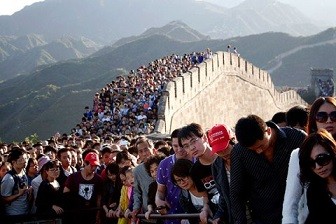The Chinese government’s latest efforts to curb the poor behavior of Chinese tourists are being questioned by the public as the week-long National Day holiday drew to a close. Despite the new blacklist regulation, holidaymakers remain ill-mannered, according to reports and social media.
Experts are now calling on the government to amend the laws by introducing harsher punishments.
Throughout the year, Chinese tourists were put on the spotlight for their ill behavior in various tourist spots across the country as well as abroad.
According to media reports, four young people climbed a monument that commemorates fallen firefighters, while some tourists reportedly touched the breasts of the status of Yang Yuhuan of the Tang Dynasty in the Huaqing Hot Springs, Shaanxi Province.
Tourists were also accused of entering prohibited areas, drawing graffiti on scenic sports, leaving trash and jumping queues.
Last Sunday, Oct. 4, the Xinhua News Agency criticized Chinese tourists' poor behavior through a commentary.
"China still has a long way to go to see a society with better quality. It will not only require self-discipline but also society's efforts," the agency said.
China National Tourism Administration's (NTA) blacklist regulation, which aims to punish ill manners such as gambling, disrespecting local customs, and damaging private or public property, proves to be ineffective despite the fact that tourism authorities can freely report violations to public security, customs and transport authorities, and even the central bank's individual credit department.
According to media reports by Modern Express, the four people who have been blacklisted for two years still travel freely.
Perhaps the criminalization of such behavior will deter ill-mannered tourists from behaving badly.
"Authorities should categorize visitors' ill manners into those who violate laws, those who are morally wrong and those who disobey local customs. As for visitors whose behavior could be considered illegal, laws should be amended to severely punish them," said Liu Simin from the Beijing Tourism Society.




























